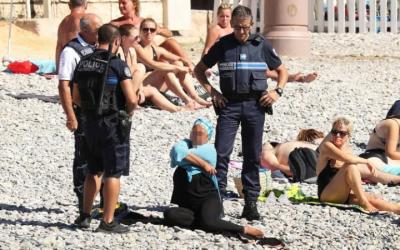Comment: Is France divesting its Muslim women population?

RAS AL-KHAIMAH, UAE -- As France is reeling from a succession of deadly Jihadi attacks which culminated with the July 14 carnage in Nice that claimed 86 lives – 30 of whom were Muslims, as well as the murder 12 days later of a Catholic priest, photographs have emerged lately of armed French municipal police bullying a woman on a beach in Nice and making her remove her burkini -– the full-body swimsuit designed to accommodate Islamic dress code.
It was the second unpleasant incident in France in one day. Earlier, a beachgoer in a headscarf was fined because her clothes weren’t “an outfit respecting good morals and secularism.” At least 30 French municipalities on the French Riviera have banned Muslim beachgoers from wearing burkinis in recent weeks. As one noted on social media, it would be interesting to see how the world would react “if armed Dubai Police forced women in bikinis to wear a burka and fined them!”
President Francois Hollande's government has backed the mayors’ decisions; arguing that the burkini “violates French laws on secularism.” However, organizations including the Collective Against Islamophobia in France and the League of Human Rights have challenged the restrictions in local courts. And late August, the State Council, France’s highest administrative court, hassuspended the burkini ban, holding that “the ban violated civil liberties including freedom of religion and movement.”
Nevertheless, more than 20 mayors, including Nice and Cannes, have so far defiantly kept the burkini bans in place. This decision by French conservative mayors preventing women from wearing burkinis is only the latest illustration of dictating Muslim women’s attire in France.In 2004, French authorities outlawed the headscarf in state schools; but in 2010, France was the first European country to ban, from all public places,full-face veils—which included burqa and niqab.
Many believe that the ban of burkinis is a “misogynistic and Islamophobic” response to the recent terrorist attacks in France. Yet, there is something mindboggling about this ban. Not only it has triggered a fierce debate in France about Muslim integration, women’s rights, and French secular values, but it also echoes humiliating and ostracizing practices of “Morality Police” in some Muslim-majority countries or theocratic states.
More than a century after the 1905 law on separation of church and state, France has always enforced a strict form of laïcité (secularism), aimed at keeping religion out of public life. But amid the rise of right-wing anti-immigrant sentiments and xenophobia - a theme once monopolized by the far-right National Front, some view burkini bans as an Islamophobic instrumentalization of secularism and blatant sexist hypocrisy. The ban is but a French fretfulness about Muslims which is regrettably played out on women’s bodies.
For Laurence Rossignol, the current French minister for women’s rights, wearing a string on the beach is a feminist issue par excellence. She asserted that the burkini “has the same logic as the burqa. It hides women’s bodies in order to control them.” She is obviously unaware of the paradox. She is literally urging women to “show some flesh.”
Former French President Nicolas Sarkozy, who is struggling to be the center-right candidate in the 2017 French presidential elections, calls burkinis a “provocation that supports radical Islam,” and Prime Minister, Manuel Valls, asserts that “the garment is part of the enslavement of women.”
Though this battle over identity politics has been exacerbated by the carnage in Nice, the debate over Muslim women’s attire has been blazing in French society for decades. With an estimated 4.7 million Muslims – as France has the second largest Muslim population in Western Europe, what seems to be a squabble over the issue of burkini is really about what it means to be Muslim and French in France. Besides Many French politicians have not yet realized that France has become a multiethnic and multicultural nation, where lifestyles are as varied as the people themselves.
Last year, French politician Nadine Morano infuriated millions of people when she depicted France as “a Jewish-Christian country of white race, which takes in foreigners.” Many outraged observers have indicated that this declaration denies the very existence of non-white and non-Judeo-Christian communities in France.
But it is impossible to decipher modern-day attitudes toward burkinis without exploring the history of racism and xenophobia in France. During French colonial rule of Algeria (1830-1962), veiling was considered as a symbol of Muslims’ backwardness, and Frenchwomen’s “unveiling” was viewed as a sign of modernity.
In 1958, French wives of military officers took it upon themselves to derail the popular support for the FLN (National Liberation Front), which led the war of independence from France. At a pro-France rally in Algiers, they staged a symbolic “unveiling” of Algerian women. A move that was antithetical to Frantz Fanon’s view of the veil as a symbol of cultural resistance.
Decades later, millions of French citizens of Maghrebi (North African) origin are facing a Cornelian dilemma: in order to be French, they must blend in by renouncing the essence that makes them different – Islam. However, common sense has not totally deserted French shores! French sociologist, Olivier Roy, considers burkinis to be “a blend of Islamic values and western lifestyle.” Burkinis are, quintessentially, antithetical to the commodification of the female body. They have empowered a new generation of observant Muslim women. Unlike their mothers and their grandmothers who might have been “secluded,” the new generation is opening up to other cultures and to the world outside of the home. And this is a basic precept in authentic Islamic teachings.
But with the burkini bans, it’s obvious that xenophobia and racism have always been the subtext of what Muslim women should wear or not wear in France. And instead of addressing the thorny socio-economic issues that are driving thousands of disenfranchised and disaffected young men and young women to join terror groups such as DAECH, France is cracking down on Muslim women.
Dr Abdelkader Cheref is a professor at the American University of Ras Al-Khaimah, UAE


